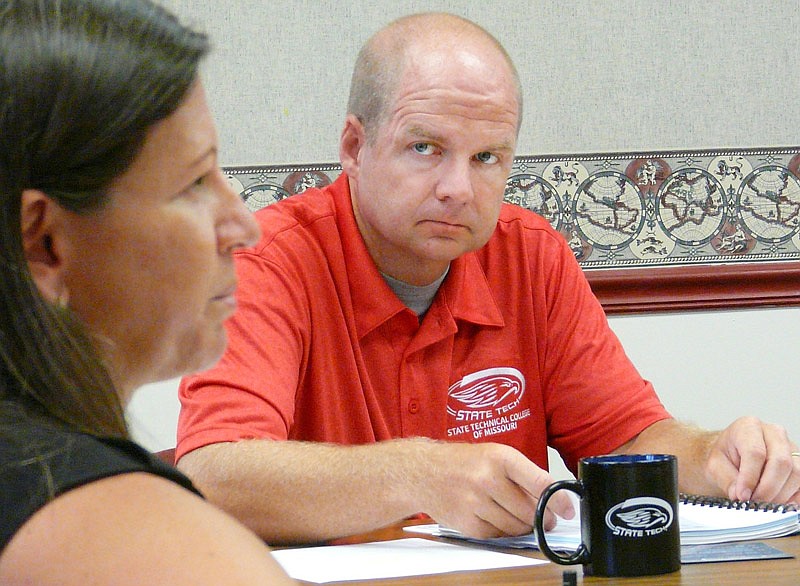LINN, Mo. - Sometime next year, or the year after, new State Technical College President Shawn Strong and his family will have a new place to live.
The school's Board of Regents decided Friday that renovating the home on the former Eugene Blackburn farm - now being called Eagle Acres - was the best option they had for the building.
During their meeting, the regents also approved a more than $28.94 million spending plan for the business year that begins July 1, modified some fees - but kept tuition at last year's levels - and approved a policy change setting minimum admission standards.
The house and some outbuildings sit on 110 acres of land east of State Tech's campus, which the school began acquiring in February 2015 for future growth options.
Outgoing President Donald Claycomb said the renovation and repairs will result in a president's residence and a Center for College Development.
Claycomb said the regents considered several options before settling on the renovations project, which will be done mostly by students and college employees.
"I think it's a good move," said Claycomb, who retires next week. "This is an investment in the college for the long range, for many presidents to come."
Also, the center - to be placed in the pole-barn-type garage next to the house - can be used "for entertainment of students, possible donors and things like that," he said. "It will be kind of like a conference area."
The regents made a temporary program permanent, causing a change in State Tech's general admissions procedures - incoming students will now have to meet certain minimum standards in reading and mathematics to be admitted.
"This would be for anyone - it doesn't matter if it's an adult coming in or a high school student," said Vicki Schwinke, State Tech's chief academic officer and dean of Student Affairs. "We want students to be prepared to succeed."
The minimum standard is a 15 score in both reading and math on the ACT test, she told the regents, later explaining: "If they come in below this 15 in reading, they're going to have a very difficult time even doing math - because mathematical calculations and problems, you have to read and comprehend in order to do that."
Those who don't meet the standards have other options with other schools, she said.
"Our resources are such that, if you come in with lower than those scores," she explained, "we don't have the resources to assist and help" students catch up.
State Tech will receive almost $5.888 million from the 2016-17 state budget that lawmakers passed in April, including a 4 percent increase in its performance funding appropriation.
That means the school's agreement with Gov. Jay Nixon not to increase tuition, in exchange for a performance funding increase, leaves in-state students paying $159.75 per basic credit hour and out-of-state students paying $319.50 per basic credit hour.
Some of the school's specialty programs charge a different tuition amount, but those were also held at the same level as the current, 2015-16 tuition charge.
Some fees increased, however. Chief Financial Officer Jenny Jacobs reported, "The increases in certain licensure fees are only because of the costs of those tests increasing."
The regents approved four budget recommendations:
$18,002,754 for the unrestricted operating budget
$2,778,394: Auxiliary budget
$1,675,554: Restricted grant budget
$6,485,392: Restricted aid budget
Jacobs spent about 90 minutes walking the board through details of the financial reports and budget proposals.
State Tech's finances are in good shape, she said, and "there's nothing I feel is going to surprise me in 2016-17."
She added, "What would be most difficult for us to handle would be an interruption in enrollment," but she doesn't expect that to be a problem.
"We anticipated moving the health programs from Jefferson City to Linn (this fall); we don't know yet if that's going to impact enrollment."
The board is moving three health-related programs that have been taught at Jefferson City's Nichols Career Center to Linn, as well as a physical therapy assistants program that had been at Capital Region Medical Center.
Eventually, those programs will move into a new building on the State Tech campus - but that building still must be designed and built. So the programs will use temporary facilities in Linn at least for the coming year.
Although he doesn't take over as State Tech's president until next Friday, Strong sat through this week's regents meeting, then told the News Tribune: "Compared to other boards I've seen, it appears they work very well together.
"Compared to other institutions, I'd say I'm very comfortable" with the school's financial condition.

